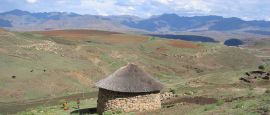Lesotho History, Language and Culture
History of Lesotho
In the 1800s Southern Africa was a region of great turmoil with various tribes occupying the land and frequent battles between neighbouring clans. The indigenous tribes that occupied the area now known as Lesotho were ousted by chief Moshoeshoe who established his own stronghold at Thaba Bosiu, 24km (15 miles) east of Maseru. He gained a reputation for his ability to stave off attacks from subsequent marauders and over time, the numbers under his rule increased.
However, in 1867, prompted by the increasing pressure of attacks from the Boers, Moshoeshoe asked the British for protection in and in doing so, Lesotho (then known as Basutoland) became a British protectorate, which meant being under control of Cape Colony. This caused considerable tension which finally came to a head with the Gun War of 1880, and resulting in the country coming under direct rule from London.
Lesotho rejected an offer to become part of South Africa in 1910 and finally gained independence in 1966, a step which has brought its own set of problems. The country became a constitutional monarchy with elected parliament, but subsequent ruling regimes have been unstable, with military coups, governmental collapses and a monarchy in turmoil, which saw King Moshoeshoe II deposed twice, before dying in a car accident. His son King Letsie III is now king and the country is currently under democratic rule by the All Basotho Convention party, headed by Prime Minister Thomas Thabane.
Much of Lesotho’s cultural legacy is tied up in its colonial one, with the architecture of older building in main towns such as Maseru bearing overtones of European influence. However, Lesotho’s past is still very much visible in the present and one can still see the cave drawings of the San bushmen and fossilised dinosaur trails that date back millions of years. In the rural areas which are often only accessible by foot or horseback, people’s way of life has not changed significantly for generations, with subsistence agricultural farming remaining the main source of income for families.
As in much of southern Africa, Aids and HIV are widespread throughout Lesotho, with around 23% of the adult population being infected. The government has stepped up efforts to combat the infection’s spread, sometimes working in conjunction with philanthropic efforts by NGOs, but it remains an incalculable task to deal with the pandemic and its consequences.




 You know where
You know where